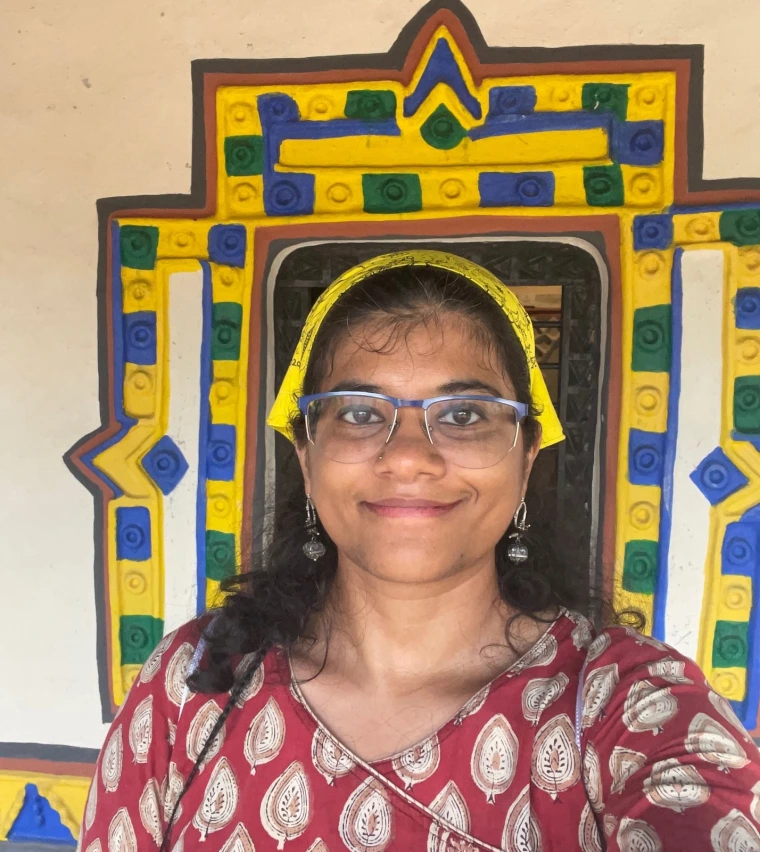Meghavarshini Krishnaswamy

Documents
About
Hello! I’m Megh (she/her), a 6th year PhD candidate in linguistics, with a research specialization in phonetics and computational linguistics. My dissertation research investigates the linguistic aspects of vocal entrainment and phonetic accommodation, to find a relationship between convergence in speech patterns and cooperation among speakers in a team setting.
My research experience includes L2 speech acquisition, pitch perception and its effects on phonemic identification, and the acoustics of complex tongue gestures. I have worked on the sound systems of Indic languages such as Malayalam, Bangla, Hindi, and Assamese. Besides phonetics, I enjoy learning about internet linguistics, encountering Englishes of the world; and composing short, fun language questionnaires for my friends on social media!
I am currently employed as a Graduate Research Assistant at the U of A DataLab, where I facilitate and design workshops on NLP and ML topics, participate in technical consultations, and engage with my university's data science community.
Previously, I worked as a GRA in the ASIST-ToMCAT project’s Speech and NLP team, where I have collaborated on projects related to multimodal modelling of human behavior, assessment of the performance of ASR transcription services, and with the automatic collection of acoustic features for speech analysis. I have also worked as a GRA in the Douglass Phonetics Lab (University of Arizona) and Splang Lab (The English and Foreign Languages University, Hyderabad), where I assisted in running experiments, creating auditory stimuli for forced choice and eye-tracking experiments, designing speech production experiments, and with data analysis and modelling.
Areas of Study
- Computational linguistics
- Speech Technology
- Speech perception and production
- Phonology of South Asian Languages
Research Interests
- Phonetic accommodation / vocal entrainment
- Automatic speech detection
- L2 speech acquisition
- Stop contrasts and the impact of articulatory and perceptual constraints
Selected Publications
- Adarsh Pyarelal, Eric Duong, Caleb Jones Shibu, Paulo Soares, Savannah Boyd, Payal Khosla, Valeria Pfeifer, Diheng Zhang, Eric S Andrews, Rick Champlin, et al. The ToMCAT dataset. In Thirty-seventh Conference on Neural Information Processing Systems Datasets and Benchmarks Track, 2023. https://papers.nips.cc/paper_files/paper/2023/hash/803d8d4b4a549d0d062f….
- · Meghavarshini Krishnaswamy and Natasha Warner. Perception of Malayalam three-way stop contrast among American English speakers. In Proceedings of the 20th International Congress of Phonetic Sciences, pages 401–405, 2023. https://www.internationalphoneticassociation.org/icphs-proceedings/ICPh….
- · GP Seema, Meghavarshini Krishnaswamy, Ramesh Mishra, Indranil Dutta. Mismatched coarticulatory information hinders lexical access of coronal stops in Malayalam. In Proceedings of the 20th International Congress of Phonetic Sciences, pages 371–375, 2023. https://www.internationalphoneticassociation.org/icphs-proceedings/ICPh….
- · Culnan, J., Park, S., Krishnaswamy, M., & Sharp, R. (2021, April). Me, myself, and ire: Effects of automatic transcription quality on emotion, sarcasm, and personality detection. In Proceedings of the Eleventh Workshop on Computational Approaches to Subjectivity, Sentiment and Social Media Analysis (pp. 250-256). https://aclanthology.org/2021.wassa-1.26.pdf.
- · Dutta, I., Redmon, C., Krishnaswamy, M., Chandran, S., & Raj, N. (2019). Articulatory complexity and lexical contrast density in models of coronal coarticulation in Malayalam. In Proceedings of the 19th International Congress of Phonetic Sciences. https://www.internationalphoneticassociation.org/icphs-proceedings/ICPh….
- · Meghavarshini Krishnaswamy, Indranil Dutta, and Ushasi Banerjee. Active cavity expansion through lingual adjustments to place of constriction in voiced geminates. In Proceedings of Meetings on Acoustics 175th ASA, volume 33, page 060002. Acoustical Society of America, 2018. https://asa.scitation.org/doi/pdf/10.1121/2.0001024.

